

Why Choose TCU?
A new book reports that the friendly, welcoming Horned Frog family is a model in higher education. Is it also a competitive advantage?
T
wice a day on weekdays and once on Saturdays, high school students interested in TCU settle into leather chairs in the lobby of the Mary Wright Admission Center. As parents grab pastries and coffee, Student Foundation members dressed in purple polo tops and khaki pants offer a firm handshake and a smile. They chat with the potential Horned Frogs asking about their school year and interests.
These informal conversations are an important part of the TCU admission process. Putting nervous prospects at ease makes for a relaxed exploration of the university and their own futures, both of which begin with a half-hour information session, followed by what the students and their parents come for — a campus tour.
Nearby, a computer screen loops a personalized welcome to each prospect. On a mid-September Thursday, the messages are for Ben from Smithville, Mo.; Sarah from Marietta, Ga.; Maria from Scottsdale, Ariz.; Alex from Centennial, Colo.; Brian from Aurora, Ill.; and Jennifer from Plano, Texas.
“What a nice touch!” one woman says, motioning for her husband to look for himself. “Wait, it’ll come around again.” The personalized gesture is a signal of the TCU way — friendly, genuine, thoughtful.
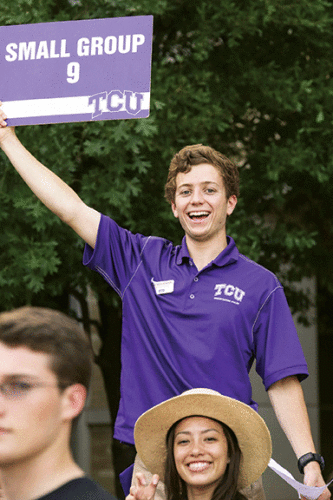
At orientation, incoming students split into small groups. Photo by Amy Peterson.
Student tour guides divide the six families into two groups and ask the high schoolers about the areas of study that interest them. The guides tailor the 90-minute walk for maximum relevance. At the start, guides share anecdotes about living with roommates and attending recent campus concerts. As the tour continues, questions start coming from the visitors.
Is it worth it to bring a car to campus? (Not essential. Public transit makes Fort Worth’s Sundance Square downtown and Metroplex hotspots accessible. Plus, there are no parking hassles.) How tough are the classes? (Anatomy and physiology are rigorous. Financial accounting comes easy for some and not others. Be prepared to study.)
But it’s the off-the-script moments that impress the high schoolers and their parents. Tour guide Taylor Ratkiewicz, a bubbly senior strategic communication major from Houston, confides that she was a little homesick as a freshman, but her resident assistant and three friends from her floor kept her going. Pausing a moment to reflect, she says, “We studied together. We went to eat together. We went out together. It felt really good to have close friends.”
Twice on the stretch between the library and University Drive, bespectacled professors recognize Ratkiewicz and stop to say hello and welcome the visitors to campus. Some group members suspect a setup. One younger sibling of a high schooler blurts, “Did you pay them to say that?” Everyone laughs, but the guide’s answer is no.
Ratkiewicz uses the question to segue to brag points about small class sizes and low student-faculty ratio. She elaborates about her camaraderie with professors. “They really do get to know students here, and they notice when you miss a class,” she says. “But they also care that you learn and are prepared for the real world when you get ready to graduate. Really they’re mentors.”
The tour moves past the Clark Brothers statue, and three male freshmen huddle together to chant, “Go Frogs! Go Frogs!” One stays to demonstrate how to make the school hand sign. “Make a peace sign, and then fold your two fingers over tight,” he said. “It looks like the horns on a horned lizard. You’ll never forget it.”
The touring group laughs, and the freshman runs off to join his classmates, hollering back: “You’ll love it here. TCU’s the best!”
As the touring visitors walk back to the admission office, a female student dressed in sorority gear spots the group’s tour guide Ratkiewicz, rushes through the middle of the group and wraps her arms around her friend. The interruption draws a chorus of “Awww.” Crossing Bellaire Drive, one mom asks another: “Is it always like this?”
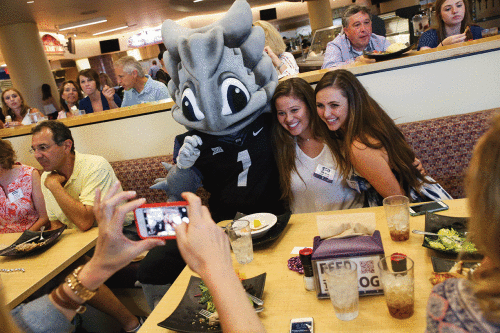
Freshmen befriend Superfrog during a summer orientation session. Photo by Amy Peterson.
For many Horned Frogs, it is. The TCU experience of a culture of caring and connection marks their trajectory from applicant, to student, to graduate. Faculty, staff, parents and supporters share it too, but the university places a priority on undergraduates making friends and establishing a support network.
The effort starts in the summer with Frog Camp, where incoming freshmen are encouraged to shed the labels that defined them in high school. Former nerds, artists, jocks and hipsters become Horned Frogs.
“There is a real sense of acceptance. Everybody is brand new and figuring out this new phase of their lives,” said Trung Nguyen, assistant director of the First Year Experience. “We talk about making that process enjoyable no matter who you are, where you came from or what your interests are.”
Nearly 80 percent of incoming freshmen participate in one of eight Frog Camps, from Colorado adventure trips to international excursions to service projects in Fort Worth. More than 125 faculty and staff members tromp in the mud and hammer nails right alongside them.
“We’re building relationships too,” said Magnus Rittby, senior associate dean for the College of Science & Engineering. He has attended at least one Frog Camp since the program’s inception in 1994. “One of the benefits for students is to see professors in a non-academic setting.
“Instead of meeting us for the first time in front of a class handing out a syllabus, they are getting to know us in a fun environment,” said Rittby. “Hopefully, that makes it easier for them to ask questions later and come to talk to us when classes begin.”
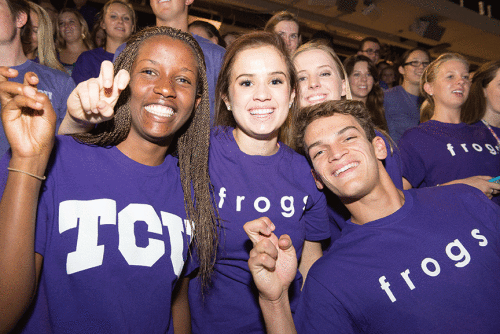
Chancellor’s Assembly in August 2015. Photo by Glen E. Ellman.
The university gets parents of new students involved too. Through the alumni association, TCU graduates host “send-off” parties at their homes for freshmen and their parents. The program, with 14 chapter cities coast to coast, starts out as food and friendship, but as the years progress the fellowship often leads to game-watching parties, social gatherings and career networking events.
“We need all parents,” said Kay Higgins ’85, director of Parent & Family Programs, which asks new TCU families to identify potential internships and employment opportunities. “We need to be able to connect our students in every state in the country and countries around the globe.
“We tell them that if they own a dry cleaner, instead of thinking, I don’t have internships here, think about whose clothes they clean. Do they have internships,” asked Higgins. “We want them to ask the people in their own networks and give us the contact info. We want the TCU network to get even bigger.”
When freshmen arrive in August to move into their dorm rooms, they find faculty, staff and alumni ready to help carry lamps and bed ruffles during “TCU Move-In.” “It’s a big statement about how much we care,” said Dan Williams, director of TCU Press and a regular volunteer. “I don’t know how many other universities encourage their faculty and staff to lend a hand on the very first point of contact. But I’m glad we do. It says a lot.”
Then, the Frogs First welcome program picks up where Frog Camp leaves off. All incoming students — band musicians, student-athletes, Chancellor’s Scholars and transfer students — are assigned to a small group led by two upperclassmen for their first year at TCU. The program’s motto: “No matter where we have come from, no matter what organization we join, we are all Frogs First.”
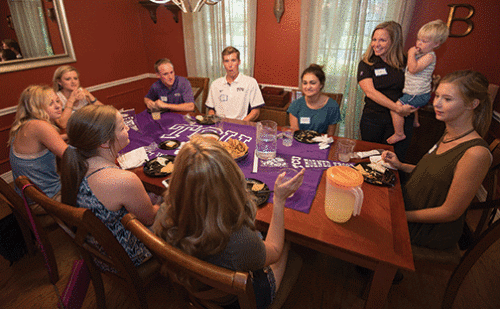
Elizabeth Rainwater Baggs, dir. of admission marketing, opened her home for a Frogs First family dinner.
Together, over four days, students pass the Light of Knowledge at Chancellor’s Assembly and visit Fort Worth venues, such as the zoo and Stockyard’s honky-tonk Billy Bob’s Texas. For freshman John Paul Camin-Calixto of Arlington, canvas painting took the stress out of the final pre-class days. “All you’re doing is having fun and making friends,” he said. “It makes it easier to get the year started off in a good way. Now, you know people.”
TCU also provides new students assistance with day-to-day resources. In required Need 2 Know sessions, freshmen and their upperclassmen group leaders discuss organization techniques, time-management strategies and how to live away from home and around people with different backgrounds.
On the Saturday night before the first day of classes, freshmen visit the home of a TCU employee for Frog Family Dinner. Around 80 staffers open their living rooms and backyards for a meal and an evening of get-to-know-you games.
“This is one of the best things TCU does,” said Danielle Walker, lecturer in nursing. “[The dinner is] not on campus. It’s in a home. I think it makes a powerful statement about how much we care about students and want them to feel supported.”
Aaron Chimbel ’02, and his wife, Bethanne ’02 (’03 M.Ed.), hosted 27 new students in August. “We think the dinner is a great way for our Frog Family to welcome new Frogs, who may be nervous, homesick and not know anyone around,” said Chimbel.
“We find that we often have connections to the students, like being from the same hometown or having similar academic interests,” said Chimbel, associate professor of professional practice in journalism. “We know what it’s like to go off to college and maybe not know anyone, and we also know how great of a community TCU is and we want to share that with the newest Frogs.”
By the start of classes, many new students have new friends, and some of those relationships last for years. “I remember what it was like when my parents dropped me off at TCU, and then drove away. It was scary,” said Elizabeth Rainwater ’00 (MBA ’10), director of admission marketing and a Frog Family Dinner host. “The opportunity to make those first few days more comfortable makes a huge difference.
“To deliver on the promise that TCU is a family is very important. We want to show that the Horned Frog family isn’t a cliché or lip service, but it’s real,” said Rainwater. “So, we share a meal and welcome them because that’s what a family does. And we hope that they will remember that feeling and continue the tradition when they’re alums.”
A month into a new semester, Housing & Residential Life launches “House Calls,” wherein faculty and staff members visit undergraduates to see how they are doing. Students can seek help on any manner of things, from making their dorm rooms warmer to talking to a counselor at the TCU Health Center.
Phil Hartman, dean of the College of Science & Engineering, canvassed two floors of King Hall, seeing 30 students, primarily freshmen and sophomores.
“The focus is on building relationships. The more they are involved with the people that live and move in their space, the more impact they will have.”
Tyler Fisher, assistant director of the TCU leadership center.
“Conversations about living away from home and getting along with roommates are topics that frequently come up,” Hartman said. “But nearly all of the students I saw expressed a gratitude for being at TCU. They were enthusiastic about the 24/7 experience here and that people genuinely were looking out for their well-being.”
For students who are eager to get involved, Connections is a free series of six weekly classes offered in September and October. “We want to give them an opportunity to start shaping the TCU community with their own hands,” said DeDe Williams, assistant director of TCU Leadership Center. “We want them to develop some self-awareness and discover their strengths and how they can use them to build up the people around them.”
Like Frog Camp and Frogs First, the Connection classes divide students into groups of 18 to 20. Each group has two upperclassmen to shepherd the conversations and ideas and a faculty/staff sponsor. Senior secondary education major Darby Dame served as the program’s student director and gained something too. “I learned to have fun and get the work done. Sometimes you want to get things marked off your checklist and you forget to build those connections. That’s what the classes cover for freshmen and transfers, but we all need that reminder.”
“Connections class is meant to help students maximize their time at TCU both in the classroom and out on campus,” said Tyler Fisher, assistant director of the center. “The focus is on building relationships. The more they are involved with the people that live and move in their space, the more impact they will have.”
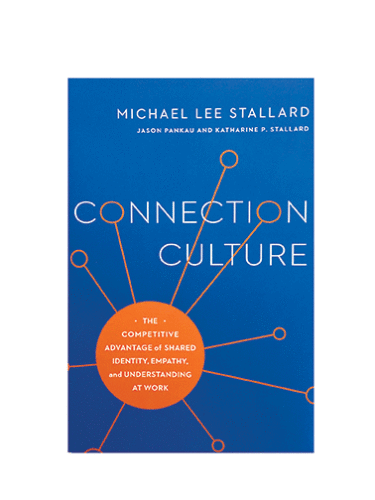
Stallard’s book highlights TCU as a model for connection culture in higher education.
A model in education
All of these efforts — plus alumni networking, academic support and athletics events — make TCU a model for connection culture in higher education, reports organization culture expert Michael Lee Stallard in his new book, Connection Culture: The Competitive Advantage of Shared Identity, Empathy and Understanding at Work. (Chancellor Victor J. Boschini, Jr. wrote the book’s foreword.)
What Google is to technology and MD Anderson Cancer Center to health care, TCU is to college life — a nurturing universe that helps its people engage with one another and permeates its process, values and product.
Stallard is not just an observer. He and wife Katharine have felt the TCU experience firsthand. The couple, both principals at Connecticut-based leadership training firm E Pluribus Partners, are parents to Sarah ’13 and Elizabeth, a senior political science major.
When the couple’s eldest daughter started looking for a “small school, big spirit,” TCU stood out. A personal tour over a Christmas break clinched it. “We were thrilled,” said Stallard. “We could see that TCU combined academic excellence with faculty and staff members who genuinely care about students.”
Just as his daughter saw what TCU offered, the author had a keen eye as well. As a Wall Street executive, Stallard observed the challenges of merging corporate cultures. Consumed with work that limited time with family and friends, Stallard felt lonely in that career.
“I wondered, Is there a best culture, and that curiosity led me to leave Wall Street, spend several years doing research and start a firm that focused on helping organizations get their people to connect,” said Stallard. “This really aligns with my personal experiences. That’s why I am really passionate about it.”
Connection is a universal phenomenon. The Japanese call it ittaikan, which means “to feel as one body of people.” In certain countries in Africa, ubuntu describes one’s connection to the community. The French phrase esprit de corps means “the spirit of the body.”
Stallard described connection as a bond among people based on shared identity, empathy and understanding. It moves primarily self-centered individuals toward group-centered membership.
“Identity is how people think of themselves – their story or narrative, including personal mission, values or reputation,” he said. “Sharing an identity with others makes people feel proud, creating unity or community among a group.”
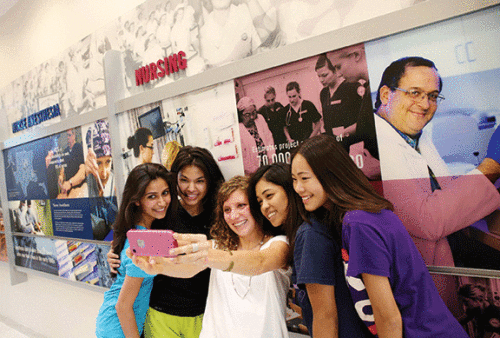
Rees-Jones Hall provides a nice background for a photo with friends.
As people get to know and care for one another, they experience a sense of empathy. The key is valuing people in and of themselves, rather than a means to an end. “In other words, I care about you simply because you’re breathing,” said Jason Pankau, a Chicago-based executive coach and pastor who collaborates with Stallard at E Pluribus.
“What makes connection so vital at a university?” Pankau asked. “Consider the opposite: College students feeling unsupported, left out or lonely. In college students, those emotions can lead to depression, isolation, substance abuse, risky behaviors, even suicide.”
Stallard said needing to be valued is a deeply felt human need. “We want to be recognized for our talents, to belong, to experience personal growth,” he said. “When we work in an environment that recognizes these realities of our human nature, we thrive.”
TCU’s strong connection culture, therefore, is a powerful competitive advantage in attracting and retaining students. “I like how TCU describes itself as the place where the Big 12 Conference comes in personal size, and small classes unlock big possibilities,” said Stallard. “To me, that’s an authentic depiction of what the university has to offer, and it’s so appealing to young people.”
In the steps of the Clarks
In some ways, the Clark brothers recognized the strength of inclusiveness when they founded AddRan Male and Female Academy. Early histories record that Addison and Randolph Clark were adamant about the school’s name. The brothers felt it signaled progress and distinction since it was the first college west of the Mississippi River to educate men and women together.
“I’m a part of a larger community of faculty and staff and administrators and donors and alumni, who are all doing the same thing.”
Chancellor Victor J. Boschini, Jr.
Today, TCU’s ethos of connection is a tradition, and it is emulated from the top. Every year, the chancellor teaches a freshman seminar course in the College of Education. By the third class, he knows all the students’ names. After a couple more, he knows what is happening in their lives. “I want to know what you think. I want to hear your ideas,” Boschini told his class this fall. “This is your classroom and your campus.”
The chancellor’s affection for students spills beyond the classroom, too. After Chancellor’s Assembly in August, Boschini lingered in the campus commons for an hour to chat and take selfies with them. During the academic year, he invites groups of students to eat with him in his private dining room and encourages feedback about academics and campus programs. At commencement, he accepts hugs on stage.
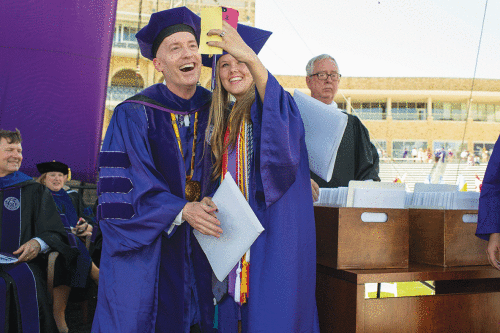
A graduating student takes a selfie with the affable chancellor. Photo by Glen E. Ellman.
Once in a while, the chancellor even saves the day. Two summers ago on a Frog Camp trip to Paris with honors students, Boschini paid for a replacement cell phone for a freshman student who lost his iPhone.
“I’m a part of a larger community of faculty and staff and administrators and donors and alumni, who are all doing the same thing,” said Boschini. “And it’s simply for the fact that they’re a part of this place too. We all are.”
Football coach Gary Patterson gets the culture of connection too. Shortly after he was named head coach at the end of the 2000 season, he asked the athletics department to invite children on the field before kickoff and run with SuperFrog across the gridiron. They became known as Bleacher Creatures.
“We put that in and still do it because we wanted to make a connection with a future generation of fans,” Patterson said. “We wanted them to love coming to TCU games, and getting to run on the field and be a part of the whole atmosphere is a part of that.”
Fans are still coming. In August, a record 2,500 waited in line to get autographs from the coach and team at “Meet the Frogs.” When the event hit the 2 p.m. closing time, the line wrapped out the door of the Sam Baugh Indoor Practice Facility. Patterson stayed until the last person reached him. All his players stayed too.
“The fans give us so much support throughout the season — at home and even traveling to away games,” said Patterson. “[Meet the Frogs] is their day. We love their passion and how loyal they are.”
In 2014, Patterson started a new tradition to thank the boisterous student section that stands and chants behind the opposing team’s bench at Amon G. Carter Stadium. At the end of every home victory before he and the team sing the alma mater and fight song, the coach tosses a game ball into the section. “They deserve it,” he said. “They’re a big part of creating a home-field advantage for us.”
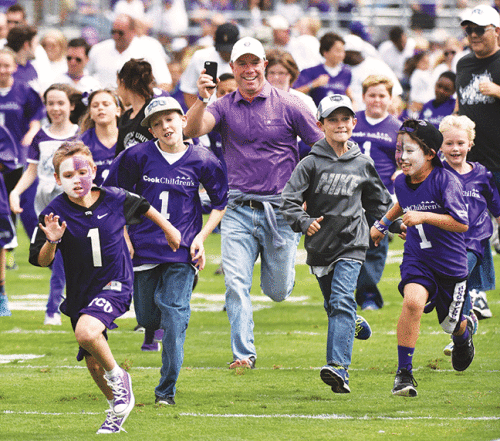
Bleacher Creatures run on the field before the TCU-SFA football game. Photo by Glen E. Ellman.
When the Frogs won the Big 12 title last December, the coach took the microphone before accepting the trophy. His initial words to the still-packed stadium were to the team’s fans: “First of all, I just want to say I love you.”
Patterson’s players are spreading TCU’s caring reputation also. In October, before the midfield handshake at the TCU-Iowa State football game, quarterback Trevone Boykin knelt to greet 7-year-old honorary Cyclone captain Abby Faber, who has cerebral palsy.
A photo snapped by Fort Worth Star-Telegram photographer Paul Moseley went viral, appearing on ESPN’s SportsCenter and NBC’s The Today Show. It generated hundreds of thousands of likes on social media. “Who but a true champion does that minutes before a big game?” Moseley wrote his personal Facebook. The photo was shared more than 8,000 times.
On Boykin’s Instagram account, the football player responded: “It’s bigger than a game. I love touching young people’s lives. #GodIsBigEnough.”
TCU fans took up the cause, too, contributing more than $33,000 to a crowdfunding effort to help the Faber family. A week later, TCU Athletics invited the Fabers to Fort Worth to meet the rest of the Horned Frog family
Frogging it forward
TCU values its connection culture so much that it launched a center in 2013 to enhance and celebrate it. [See sidebar on page 36.] And new movements are springing up each semester.
“Frog It Forward” is the newest, debutingd this fall as a community service project between Student Development Services and Chancellor’s Leadership Program. Patterned after the 2000 Hollywood film, Pay It Forward, the initiative urges Horned Frogs to perform random acts of generosity and service on and off campus.
If someone witnesses another person showing kindness — buying a stranger a cup of coffee, volunteering at a non-profit group, leaving a note behind to show appreciation — then publicize the act on social media channels with the hashtag #FrogItForward to spread the goodwill.
“All we’re doing is trying to promote what TCU students, faculty and staff are already doing,” said Kyle McLaughlin, a senior engineering major, who is co-leading the effort.
Jordan Hamilton, a senior marketing major, said celebrating community-building actions are as important as performing them.
“Part of what makes TCU a place of caring and support is that we honor those who perpetuate it,” he said. “That’s one of the ways we pass the knowledge onward, so new people coming into the TCU community understand what it means to be a Horned Frog.”
For more information about TCU Center for Connection Culture, contact Ann Louden at a.louden@tcu.edu.

Your comments are welcome
2 Comments
Exactly!
In 1976 when I was choosing an undergraduate venue, I had not even heard of TCU before. But, with the ease of communication and “real” letters from admissions department (when you held them to the light you could see the “white out) I was hooked. Although not as organized as it is now , the essence of the TCU community existed in that day . All the same experiences just originating from each individual on campus. Just saying the culture that exist is simply a result of TCU’s DNA. Proud to be a Frog!
My daughter is an entrepreneur. She’s too busy for college right now. How do I convince Her to take at least one class a year?
Related reading:
Features
Michael Stallard on Connection Culture
TCU is a model of connection, writes this Horned Frog dad in a new book.
Features, Research + Discovery
Nine Questions of Undergraduate Research
From the dark web to poisonous spiders, undergraduates and their faculty mentors investigate big questions in a search for useful results.